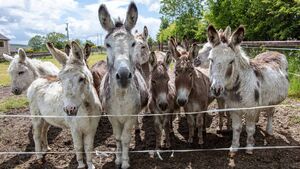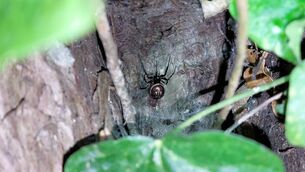The humble donkey served rural Ireland well

Rescue donkeys graze in the fields at the Donegal Donkey Sanctuary in Castledooey, Co Donegal, in 2020. Picture: Paul Faith/AFP via Getty Images
I heard a nice story recently about a man who lived on the side of a steep hill. When bringing home his turf from the bog with his ass and cart, he would have to take off half the load as he neared home. The hill was too steel for the ass to pull the full load. I got two things from the story; the man’s pace of life and his respect for the ass.
The story also reminded me of a time when most small Ox Mountain farms had an ass. The ass was the poor man’s pony – in the same way as the pony was the poor man’s horse.
Ass or donkey – is there a difference and if so, what is it? One theory is that the word donkey was first used as slang for the animal then only called an ass. Another line of investigation suggests that the ass and the donkey are indeed the same animal, Equus Asinus. The term donkey may even come from the Irish, meaning little dun-coloured animal. A final suggestion, and it’s not a bad one, is that domesticated asses have become known as donkeys. All in all, things point to the ass being first and the donkey being second. I like to use the word ‘ass’. It is more ‘local’ and strikes an earthier tone.
takes us back to the original wild ass and sets the scene. It is a desert scene and one that is a long way removed from the steep boreens of the Ox Mountains.
The Donkey Sanctuary, the well-known UK charity, provides an infinite amount of information on the origin and history of the ass. A bit like the African and Asian elephants, it seems the ass had two separate origins.
The ass was first domesticated around 6,000 years ago in North Africa and Egypt for meat and milk – no mention of an Irish bog at that point. Around 2,000 years ago, asses were among the draught animals used to carry silk from the Pacific Ocean to the Mediterranean along the Silk Road. The journey ended in the Mediterranean ports of Greece, Italy, and the Middle East. In Greece, the ass was found to be an ideal animal for working on the narrow paths between the vines – again, no hint yet of having to cart turf in the windswept West of Ireland.
The Romans were responsible for the arrival of the ass into Northern Europe. The Romans used them in their new vineyards, appearing as far north as France and Germany. The ass came to England with the Roman invasion of Britain in AD 43. After the mid-17th century, Oliver Cromwell's invasion of Ireland saw the arrival of asses here, when they were used to transport the trappings of war.
Eventually, increasing numbers of asses were introduced to the country, opening opportunities for poorer Irish farming families to keep a cheap, working draft animal. The ass was eventually introduced to Irish bogs and the tedious task of drawing home the turf. It was a long way from the sweet-smelling paths of the Silk Road. Maybe it is no wonder the ass developed the reputation of being obstinate.
Most small farms in rural Ireland had an ass. This was before the days of small tractors when the pace of life was easy and slow. No more than the Honda 50, the ass found a ready-made home in Ireland. The poor ass could not have been happy with the climate but at least he was no longer being chased by lions and tigers.
The jobs best suited to the ass were light farm tasks such as snigging cocks of hay, putting out turf with a pair of creels on his back or bringing milk to the creamery. If you asked an ass to do too much he would just refuse to pull. He seemed to know his limitations and no amount of persuasion, gentle or otherwise, would change his mind.
Training an ass was a job for a strong, fit man. A young ass could be spirited and give no end of trouble when being harnessed for the first time. Not a single ass that ever I knew from childhood was properly trained – there was always a flaw. One had no reverse gear, another couldn’t pull in a straight line and another might bite the fingers off a small child. You might have a lazy ass or a kicking ass. To find one that was reasonably straightforward was almost impossible.
We had an ass at home. His name was Sam and as asses go, he was a big one. My father could manage him fairly well. He could get Sam to trot nicely when the cart was empty and he could get him to ‘back’.
Backing or reversing an ass and cart is a real art form. It is a bit like forcing an elephant backwards in a cage where you must push and punch and elbow the elephant into position, while at the same time alternating words of encouragement and foul-mouthed abuse in the direction of the unfortunate beast.
I found it an impossible task whenever I was asked to do it. Failing to get either Sam or his cart into the correct position would then draw my father upon me. At this point, I came in for treatment very similar to that which the ass received. Backing Sam was a very, very stressful manoeuvre.
Eventually, Sam got old and was replaced by a newer model. The next fellow was called Diamond – named after the man who sold him to my father. Diamond was a bad ass. My father fancied himself as a bit of an ass whisperer but his own aging process, coupled with the youthful exuberance of the new ass did not make for a successful campaign. My father and the ass fought with each other for about a week and then Diamond got his marching orders. That was the end of us and asses.
Hats off to the little ass, he served us well for long enough. If he was a bit thick at times, maybe he was well entitled to be, for he had ended up in a harsh place a long way from his working apprenticeships on the Silk Road.
Sadly, the only place I have seen asses working in recent times is on the streets of Gaza. They seem out of place on bombed-out city streets ferrying destitute and frightened families trying to escape the terror or war. The asses too look frightened as they scurry along pulling overloaded carts of basic belongings amid scenes of utter carnage.
The inclusion of the ass in these scenes reflects a certain downtrodden tone; a people who have little more than an ass and cart and simple possessions. How easily disposed they are, how easily terrorised. Of all the places on earth that the ass or the donkey has served mankind, this must be the very worst.





